Mish's Global Economic Trend Analysis |
- Stunning Pictures of Senseless London Riots; Conflagration and Carnage in the Capital and Beyond; London Riots: Live Blog
- Asia Pacific Opens Deep in the Red: Australia -4.73%, Japan -4%, South Korea -4.81%; US S&P Futures -2.5%, Nasdaq -2.6%; Gold +$17, Silver -$.50
- Secretly Broke in Australia
- Butt Ugly Close; Futures Selloff Continues After Equity Close
- In Vote of "No Confidence" Bank Stocks Hammered Mercilessly - Why Shouldn't They Be? Citigroup, Bank of America, Wells Fargo Bankrupt
- Email From "An Irate German" Over the Transfer Union; German Bank Exposure by Country; Harvard Economist Seeks "Transfer Union" and US Inflation
- US Dollar, Swiss Franc, Yen Rally; Euro Reverses Gains; Expect Intervention to Fail; Gold Holds Gains in Ocean of Devastating Red
- Gold Cries "BullSheet"
| Posted: 08 Aug 2011 08:49 PM PDT Boston.Com, The Telegraph, and The Guardian have stunning images of massive riots in the UK. Sources report the exact cause for massive riots, now in their third day in London, is unknown. While the trigger may be a deadly shooting by police, I believe the cause is social-breakdown fueled by rising unemployment, loss of dignity, and a desperate realization that hope for a better future and for government to do something responsible about jobs and rising food prices is fruitless. Boston.Com reports on London Riots. Two nights of rioting in London's Tottenham neighborhood erupted following protests over the shooting death by police of a local man, Mark Duggan. Police were arresting him when the shooting occurred. Over 170 people were arrested over the two nights of rioting, and fires gutted several stores, buildings, and cars. The disorder spread to other neighborhoods as well, with shops being looted in the chaos. Collected here are images from the rioting and the aftermath.The article displays 26 stunning images. Here are a few of them.  Fire fighters and riot police survey the area as fire rages through a building in Tottenham, north London on Aug. 7, 2011. A demonstration against the death of a local man turned violent and cars and shops were set ablaze. (Lewis Whyld/PA/AP)  A double decker bus burns as riot police try to contain a large group of people on a main road in Tottenham on August 6, 2011. (Leon Neal/AFP/Getty Images)  Fire rages through a building in Tottenham on Aug. 7, 2011. (Lewis Whyld/PA/AP)  Buildings burn on Tottenham High Road in London during protests on August 6, 2011. (Matthew Lloyd/Getty Images)  A shop and police car burn as riot police try to contain a large group of people on a main road in Tottenham on August 6, 2011. (Leon Neal/AFP/Getty Images) There are 26 images in the article. It is worth a closer look. London riots: conflagration and carnage in the capital and beyond The Guardian reports London riots: conflagration and carnage in the capital and beyond Riot police charge past burning buildings on a residential street in Croydon. Photograph: Dylan Martinez/ReutersThe above text was regarding Croydon. The Guardian also highligted major riots in Birmingham, Battersea, Lewisham, Kilburn, and isolated outbreaks in Liverpool. London Riots: Live The Telegraph has rolling coverage of London riots: live Rolling coverage of the third night of violent disturbances in London, Bristol, Liverpool and Birmingham, with widespread arson and looting reported across the capital.The Telegraph article has numerous video is a "live blog" scrolling format. Rule of the Mob Tomorrow's Daily Telegraph Front Page  Fuel for these riots has been building up for some time, and it finally erupted. One has to wonder in a Spring/Summer of riots, what country is next. Mike "Mish" Shedlock http://globaleconomicanalysis.blogspot.com Click Here To Scroll Thru My Recent Post List |
| Posted: 08 Aug 2011 06:48 PM PDT Yet another bloodbath is in the making in Asia Pacific. Moreover US futures are solidly in the red, and that is on top of the after-hours session that was in the red. Also note that gold is soaring while silver and crude tank. Here are a couple screenshots. Asia Pacific Equities  Click here to refresh the Yahoo!Finance list of Asia Pacific Equities US Futures Rapidly Sinking  The first chart is delayed. The US Futures chart is real-time as of 8:22 PM central. The following charts are delayed. In the time it took me to finish this post (it is now 8:44) S&P futures are down 29 points (2.5%) and Nasdaq 100 Index Futures are down 53 points, (2.6%) and that is on top of the after hours session which was also down. S&P: 1083 Nasdaq: 1984 Cash values will be a bit higher. Energy  Gold vs. Silver  Gold continues to act like a currency. Silver continues to act like a derivatives plaything. Bear in mind silver has huge industrial usage while gold (not counting jewelry) only has 10% or so industrial usage. Yes, I know all about the reported silver shortages. So does everyone else and so does the market. Mike "Mish" Shedlock http://globaleconomicanalysis.blogspot.com Click Here To Scroll Thru My Recent Post List |
| Posted: 08 Aug 2011 05:39 PM PDT The housing boom in Australia is now an escalating bust. Many Australian homeowners put every cent they had into their homes and they needed double incomes to just scrape by. Unfortunately, those jobs are disappearing in a construction and commercial real estate bust. I warned about this event for years, but in Australia, like everywhere else "It's Different Here" until it's not. 60 Minutes Australia picked up the Secretly Broke story in "The Big Squeeze". Click on link for a 60 Minutes video. Here is a partial transcript. ALLISON LANGDON: To the world, Tracy and David Dodd are the very model of Australia's relaxed and comfortable middle-class. They're living the dream – three kids, a mortgage and a suburban family home on an acre block. But Tracey and David have been keeping a secret from their family and friends – they're drowning in debt. No-one to look at you would think that you are struggling.Blame Galore The story continues with Phil and Sandra Box who claim they never did anything wrong. Of course they did. So did Tracy and David Dodd. Not only did they pay too much for a house, they had no cash cushion if one or more of them lost their job. Up until May 2011 or so, I received numerous emails every week from persons in Australia telling me how Australia was different, how China and commodities were a sure thing and would keep housing afloat, and how the Australian stock market would not sink. Those emails continued but at a dwindling pace for another month or two. This is what the Australian stock market looks like now. $AORD Daily Chart  click on chart for sharper image Poof - Just like that 20% evaporated since Mid-April. Moreover, China is clearly slowing which will put a damper on commodities. Indeed the world appears poised for another global recession. The RBA was actually thinking of hiking last week. I said they wouldn't and it would not matter one iota once the housing bust got underway. The housing bust has now smashed commercial real estate as well. So who is going to be hiring now? Flashback January 2, 2011: Australia Heads For Economic Crunch; Similarities Between Australian and Chinese Stock Markets; Global Property Bubble Cycles The party is over in Australia. Many anti-dollar investors and Pollyannas living down under just don't realize it yet. Nonetheless, Australia faces an economic crunch as family finances collapse under the burden of record debts, rising interest rates and utility bills.Flashback January 10, 2011: Australia's "Tulip Mania" About to Crash; 44% Jump in Property Listings Proves the Proposed Housing Shortage is Gargantuan Myth; Playable Actions For years I have been hearing about a housing "shortage" in Australia. That myth has been shattered by latest stats that show a 44% jump in property listings.I am curious, did anyone down under reading that post exit the stock market and pick up some popcorn? Flashback April 13, 2011: Housing Denial in Australia Feeds Off Same Myths We Heard in the US It is amusing to watch Australian analyst after analyst cite the same silly myths regarding housing that we saw in the united states.May 13, 2011: Economic Bust in Australia:Near-Record Corporate Bankruptcies, Employment Drops Unexpectedly; Rise in Bad Home Loans;Record Low Property Transactions Those looking for bad news can find plenty of it in Australia, which in my opinion is soon headed for recession and rate cuts.May 16, 2011: Australia Real Estate Bulls Trot Out Every Cliché Known To Man Select Clichés from the ArticleJuly 10, 2011: Permanently High Plateau Theory Touted for Australia Housing; Real Estate Agents Refuse to Disclose Sale Prices At the height of every boom, bullish clowns inevitably come out of the woodwork touting the "permanently high plateau" prices will not drop much theory.August 4, 2011: Eighty-Five Australian Building and Construction Firms Go Under in a Month; Crazy to Buy a House in Australia Now The implosion in Australian housing is now in full swing as Eighty-five building and construction firms go under in a month.This story is so sad because Australians had every warning in the world. All they had to do was watch the US housing bubble burst. However, you cannot explain anything to anyone with a firm conviction "It's Different Here". Australian homeowners are now finding out they do not own their home. Instead, their home owns them. Addendum: Here is a 9:27 PM Central snapshot of Asia-Pacific Equities from Yahoo!Finance.  Mike "Mish" Shedlock http://globaleconomicanalysis.blogspot.com Click Here To Scroll Thru My Recent Post List |
| Butt Ugly Close; Futures Selloff Continues After Equity Close Posted: 08 Aug 2011 01:42 PM PDT Mercy! What a close! However, being the ever-optimist, I prefer to look at the bright side of things. Get your party hats ready. Another DOW 10,000 party may be on the way. Equity Closing Snapshot 3:00 PM Central 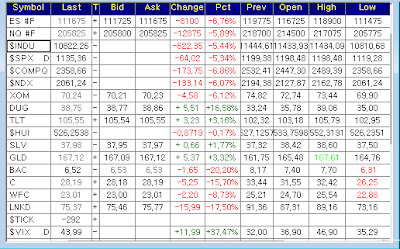 click on chart for sharper image Notes: ES = S&P 500 Futures NQ = Nasdaq 100 Index Futures $COMPQ = Nasdaq Composite Index $SPX = S&P 500 Cash Index $NDX = Nasdaq 100 Cash Index DUG =Double Inverse Energy ETF S&P 500 Cash Index was down 5.34% Dow Cash Index was down 5.44% Nasdaq Composite Index was down 6.86% Nasdaq Cash Index was down 6.07% Futures Closing Snapshot 3:15 PM Central  click on chart for sharper image Nasdaq Index Futures sold off another 19 points in the extended futures trading session. 147.25 points total. Good News: S&P 500 futures only sold off an additional 5 points in the extended session. Optimists like me can always find something to cheer about. Today's Recap
I am pleased to report that I am not the only one who looks on the bright side. InstaPundit comments ... "Dow Finishes Down 634 Points. Obama's speech certainly did nothing to slow the drop, though I suppose the White House will argue that it would have been 734 without the speech, meaning that Obama saved or created 100 Dow points . . . ." Mike "Mish" Shedlock http://globaleconomicanalysis.blogspot.com Click Here To Scroll Thru My Recent Post List |
| Posted: 08 Aug 2011 11:56 AM PDT Bank stocks were murdered today, but why shouldn't they be? They are capital impaired, still hiding questionable assets off their balance sheets. All of them hide behind postponement of mark-to-market rules that would show one thing if enforced: they are bankrupt. Citigroup Down 17% on the Day, 42% on the Year 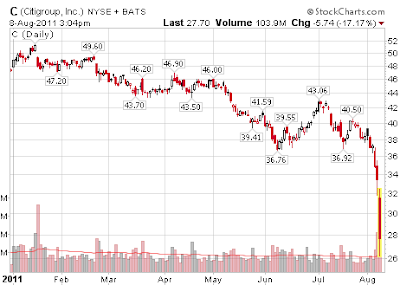 click on any chart for sharper image JP Morgan Down 7% on the Day, 17% on the Year  Wells Fargo Down 7% on the Day, 23% on the Year 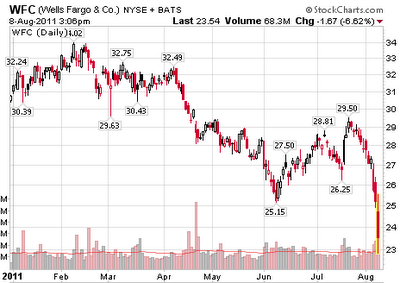 Bank of America Down 17% on the Day, 50% on the Year 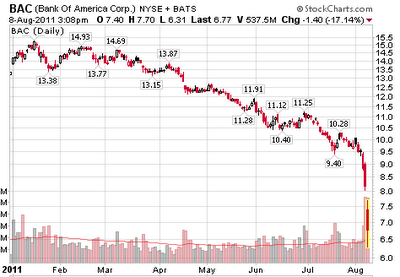 Those are intraday snapshots, actual results on the close will vary. It's high time the market take Fed comeuppance, analyst bullshill, and bank CEO arrogance to task, and today the market did. For the last two years banks should have been raising capital. Instead they wanted to start or increase dividends. Now they are going to have to raise capital while trading at 52 week lows, some down 50% or so on the year. Good luck with that. Mike "Mish" Shedlock http://globaleconomicanalysis.blogspot.com Click Here To Scroll Thru My Recent Post List |
| Posted: 08 Aug 2011 10:07 AM PDT An "Irate German" sent an Email this morning about the European Nanny State and more specifically about the EuroZone "transfer union" that will strip Germany of wealth to bailout the rest of Europe. Before we get to the Email, let's first take a look at the size of German bank exposure to the rest of Europe and a call from an economics professor just today for exactly the kind of "transfer union" my reader opposes. Risks to German Banks Der Spiegel has interesting graphs and commentary in a German-to-English translation Merkel's rescue experts reject Italy According to SPIEGEL, experts doubt whether Italy could be rescued by the European EFSF rescue - even if the fund tripled. There are currently 440 billion euros in the fund, after deduction of the Greek aid, and that is insufficient to support possible future shaky candidates. That is my modified translation. Here are a couple of charts.   'Some European Countries Are Fundamentally Bankrupt' In an interview on Der Spiegel, Kenneth Rogoff, a professor of economics at Harvard University, makes the case 'Some European Countries Are Fundamentally Bankrupt'. My comments are embedded inline. SPIEGEL: With the turmoil on the global stock markets, is the world staring into a new financial abyss?Let's now turn our attention to an email that got my attention. Email From An "Irate German" Dear Mish,Marco is irate, and in my opinion he has every right to be. How dare economist fools like Kenneth Rogoff propose German taxpayers bail out all the rest of Europe without even giving those taxpayers a vote. Will Germany Leave the Euro? Last Thursday I asked the question: Another Major Feud Between the German Central Bank and the ECB Over Resumption of Bond Purchases; Will Germany Leave the Euro? Jean-Claude Trichet is Out, Mario Draghi is InBall in Germany's Court Let's finish with another look at what I said in ECB to Buy Italian Bonds; Italy Seeks Constitutional Amendment to Require Balanced Budget; Ball in Germany's CourtIf the alternative is a transfer union wherein Germany backstops the entire rest of Europe, then yes, Germany should consider leaving the Euro. Bear in mind, should that happen, the rest of Europe would then default on debt owed to German banks. Thus, German taxpayers are going to be screwed one way or another. Yet, from my perspective, ceding sovereignty to a European Nanny State for the sake of the EU would not be a good choice. However, that is not for me to decide, fools like Kenneth Rogoff to decide, or even politicians like Chancellor Angela Merkel to decide. German citizens should be involved in this decision. The citizens of Iceland chose wisely, I think German citizens would as well. Mike "Mish" Shedlock http://globaleconomicanalysis.blogspot.com Click Here To Scroll Thru My Recent Post List |
| Posted: 08 Aug 2011 07:21 AM PDT Overnight gains in the Euro were short-lived as an early rally quickly faded. The Euro reached as high as 1.4393 vs. the US dollar but is now solidly in the red at 1.4166. 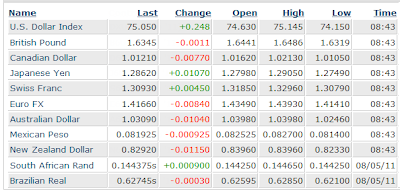 click on chart for sharper image The same applies to the US equity indices. Prior to the morning bond intervention, US equity futures were down around 30 points. They rallied to minus 10. However at the US open, futures were once again down 30 points. Expect volatile action. I am not willing to guess how the day ends. However, I will guess how this intervention ends - and that is badly - in spite of the early apparent success of the ECB's Bond-Market Bazooka Play. I am sticking with what I said in Gold Cries "BullSheet" Intervention Cannot Possibly WorkOcean of Devastating Red Gold has held on to most of its gains, silver has not.  The $HUI (unhedged mining index), SLV (Silver ETF), GLD (Gold ETF), TLT (the Lehman 20+ Year Treasury Index), and DUG (an inverse energy index) are about the only things "green" on my screen in an ocean of devastating red. Equity futures just plunged to a fresh low after one attempt at a flagpole rally failed. The day is still early. Mike "Mish" Shedlock http://globaleconomicanalysis.blogspot.com Click Here To Scroll Thru My Recent Post List |
| Posted: 08 Aug 2011 01:46 AM PDT In an extreme act of extreme hubris over common sense, a "forced rally" has begun. S&P futures that were down as much as 37 points are now down 14 points. It is 2:30 AM Central. I do not know what the actual stock market open will look like. However, I do know "sheet" when I see it. A few times recently I used the word "BullSweet". One reader objected saying I was too polite. He proposed the word "BullShill". I like the word "BullShill" actually, when someone is shilling something. However, the appropriate word is not sweet or shill but (well you know what it is). At any rate here are some charts at 2:45 AM central US. S&P 500 Futures Night Session Action  S&P 500 Futures Last Two Days  Those charts were captured perhaps 5 minutes apart so they are not perfectly in sync. Do not be confused by the volume spike in the first chart. It is relative to the illiquid night session. Both the initial selloff (perhaps manipulated) and the rally (definitely manipulated) are on light volume. Let's also take a look at action in Asia. Here are a couple of snapshots. Asia-Pacific as of 12:30 AM  click on chart for sharper image Asia-Pacific as of 3:00 AM  click on chart for sharper image Taiwan which was down 4.55% is now down "only" 3.82%. South Korea which was down a whopping 6.5% is now down a mere 3.82%. China was down 3.68% and is now mysteriously down even more at 3.79% European Bonds Rally (or Sink) "As Expected" In the wake of announced intervention, one might expect the bonds of Italy and Spain to rally and the bonds of Germany to sink. That is what happened. The Bloomberg charts are hopelessly out of date (as usual) but the quotes are accurate. (Can someone at Bloomberg please fix this!) Anyway, here are some snapshots of bond action. Italy 10-Year Government Bonds 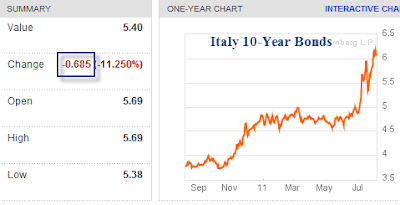 Spain 10-Year Government Bonds  Germany 10-Year Government Bonds  Intervention Cannot Possibly Work Does anyone seriously think this intervention will work? Short of the ECB buying all Italian bonds, all French bonds, and all Spanish bonds how can it? Even then, by what rationale can anyone other than an idiot purport "the system is working". For more on idiots and how they think, please consider Do These Idiots Realize How Stupid They Sound? Here is one more chart to consider. Gold Futures  Gold has spoken. It was a one word sentence regarding G-7 coordinated intervention: BullSheet! Mike "Mish" Shedlock http://globaleconomicanalysis.blogspot.com Click Here To Scroll Thru My Recent Post List |
| You are subscribed to email updates from Mish's Global Economic Trend Analysis To stop receiving these emails, you may unsubscribe now. | Email delivery powered by Google |
| Google Inc., 20 West Kinzie, Chicago IL USA 60610 | |


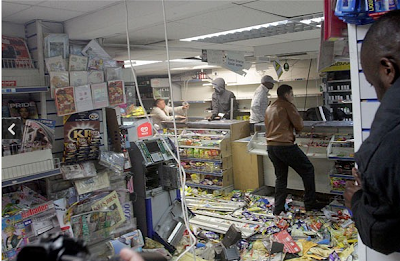
No comments:
Post a Comment